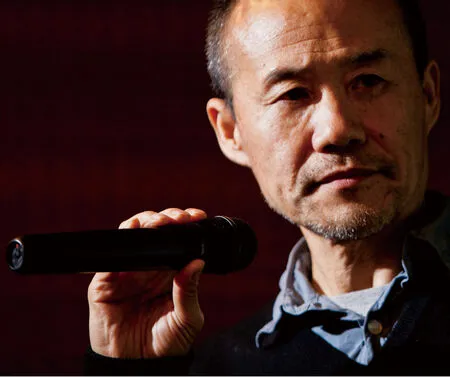Vanke in Remote Control
2017-09-03ByWangShi
By Wang Shi
Vanke in Remote Control
By Wang Shi

Wang Shi
founder and chairman of Vanke, the largest residential real estate developer in China
How I managed to run the business while climbing the mountain
At Harvard University Asia Center, my next-door neighbor was a retired general from the Ministry of Defense of Japan, a one-year visiting scholar. When talking with me, he had thought that I was a retired entrepreneur.
In fact, at Harvard, few people believed that I was still the Chairman of the Board of China’s biggest real estate agency while I was in the U.S. Was that possible? How did you have the time to do both? How did you handle your work in China while you were here in the States, like the business meetings, board meetings, and shareholders’ meetings?
After quitting my job of general manager in 1999, I no longer deal with the routine work. Yet as the Chairman of the Board, I am sure to attend and chair the Board meetings and the shareholders’ meetings. However, there might be an exception. I was absent from the shareholders’meeting in April 2003, as I was climbing Mount Everest at that time. As a listed company, Vanke usually holds the board meeting at least once every three months.
How was I able to attend the Board meeting when I was in America? I made it by means of the internet video technology. Vanke has set up its video conference system long before, and I had a video software installed in my computer. Was it possible to attend the meeting by that in my flat? The IT section said no problem, but the office of the Board expressed their worries. After all, the setting of a fl at did not fi t in with the atmosphere of the conference. Therefore, I finally chose a conference room of a local hotel in Boston. When I got connected with my company through the longdistance video system of the hotel’s business center, the manager of the center said that the equipment had been put in service for three years, and I was the first customer. Since then, the fi rst has become a frequent visitor.
I suppose, the Chairman of Vanke needs to do three things: fi rst, strategy; second, choosing the right person for a job; third, daring to take blames when things go wrong.
As to strategy, Vanke chose the real estate industry, taking the road of specialization. The decision of specialization was comparatively easier. If we had chosen pluralism, the decision-making would have more aspects involved, thus the situation would have become more complex, the cost of decision-making being higher. I once said, when China’s urbanization comes to an end, and the cities no longer need any housing, I hope Vanke will be both the builder of and provider of service to the last residential community. This statement actually is Vanke’s strategic decision, which, once decided, has got to be adhered to fi rmly and steadily.
Secondly, choosing the right person for a job. As the saying goes,“Do not suspect the person you use, and a suspected man cannot be used.” My point is that, from the perspective of management, each person is suspicious, me included. You must be clear about it that we are all ordinary people. Everyone has dual sides of justice and evil, kindness and ugliness, orientation to kindness and wickedness, tolerance and jealousy. You’ve got to suspect a man when using him, but it is a kind of institutional suspicion. Just like the management system, personnel system, fi nancial regulations, contract review, resignation audit etc., all of which are intended to restrict the administrators and the employees toensure that they could avoid making mistakes, or, they could detect their mistakes and revise them timely.

Undoubtedly, people vary from person to person. There might be some able men among the ordinary ones. However, I prefer not to use them. The so-called “able” men are those who can achieve what others cannot. Such kind of people might do a good job if they are inventors, or entrepreneurs, but not so if they are the executives for enterprises. As the able men love to break the routine but hate to observe the rules and regulations. It is often the case that while the able men are playing their part in an enterprise, they also bring great harm to it. In addition, equality of opportunity, avoiding the interference of friends and relatives, and simpler interpersonal relations should also be achieved. Finally, staff is the biggest fortune for an enterprise. If you care for them, treasure them, and persistent training is absolutely necessary.
Thirdly, daring to take blames when things go wrong. When an enterprise fares well, the achievements, honor and aureole will naturally fall on the founder, and the Chairman. What if something goes wrong in the company, who should take responsibility for that? Of course, it is also the Chairman. But many leaders don’t think so, instead, they shift the blame onto their inferiors:“What’s wrong with you? You failed to meet my trust of you, and made things in such a mess.”
When problems emerge in an enterprise, the top leader could not be free of responsibility. The first responsibility might be the mistake in decision making, which must be the leader’s responsibility; secondly, if the decision is right, but he chooses the wrong person, that is the neglect of his supervisory duty, and it is still his fault. Of course, if he has made many mistakes, it won’t do with selfcriticism only. He should take the blame and resign from his of fi ce.
In fact, I had been climbing mountains in the last decade. At that time, it would also be about two months before I came back, but that didn’t affect Vanke’s normal operation. And now it’s just that climbing mountains has been changed into studying on campus. From the point of communication, it’s even more convenient. I am still climbing mountains, not the physical ones but the mountains of knowledge in my heart.
(From VIP of Fortune, March 2015. Translation: Liu Jie)
